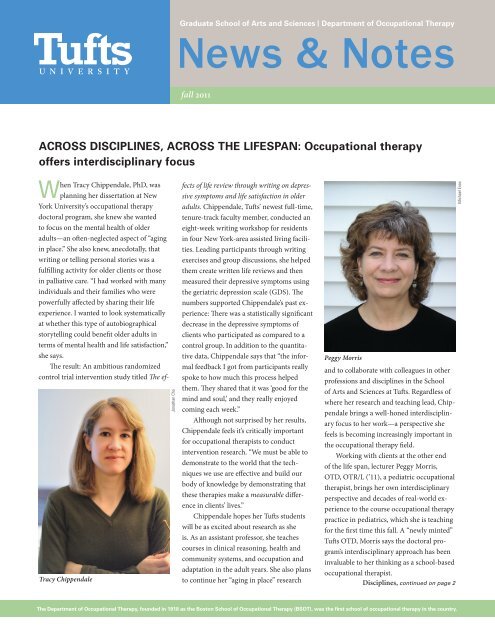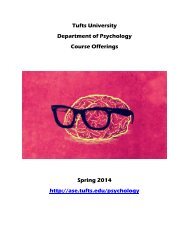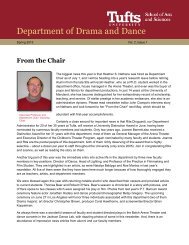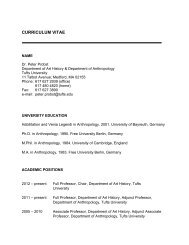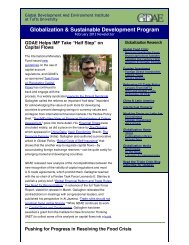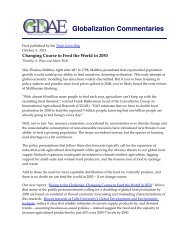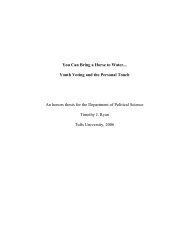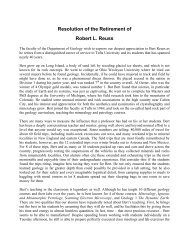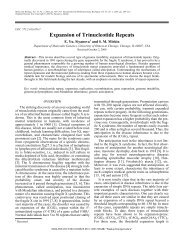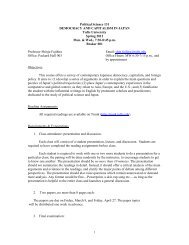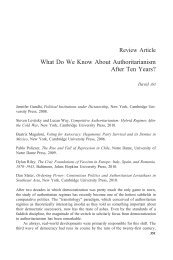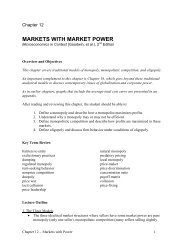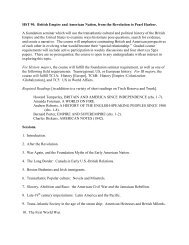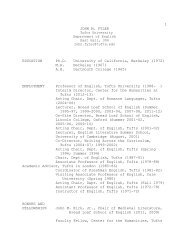Fall 2011 - Tufts University
Fall 2011 - Tufts University
Fall 2011 - Tufts University
Create successful ePaper yourself
Turn your PDF publications into a flip-book with our unique Google optimized e-Paper software.
ACROSS DISCIPLINES, ACROSS THE LIFESPAN: Occupational therapy<br />
offers interdisciplinary focus<br />
When Tracy Chippendale, PhD, was<br />
planning her dissertation at New<br />
York <strong>University</strong>’s occupational therapy<br />
doctoral program, she knew she wanted<br />
to focus on the mental health of older<br />
adults—an often-neglected aspect of “aging<br />
in place.” She also knew, anecdotally, that<br />
writing or telling personal stories was a<br />
fulfilling activity for older clients or those<br />
in palliative care. “I had worked with many<br />
individuals and their families who were<br />
powerfully affected by sharing their life<br />
experience. I wanted to look systematically<br />
at whether this type of autobiographical<br />
storytelling could benefit older adults in<br />
terms of mental health and life satisfaction,”<br />
she says.<br />
The result: An ambitious randomized<br />
control trial intervention study titled The ef-<br />
Tracy Chippendale<br />
Jonathan Cho<br />
Graduate School of Arts and Sciences Department of Occupational Therapy<br />
News & Notes<br />
fall <strong>2011</strong><br />
fects of life review through writing on depressive<br />
symptoms and life satisfaction in older<br />
adults. Chippendale, <strong>Tufts</strong>’ newest full-time,<br />
tenure-track faculty member, conducted an<br />
eight-week writing workshop for residents<br />
in four New York-area assisted living facilities.<br />
Leading participants through writing<br />
exercises and group discussions, she helped<br />
them create written life reviews and then<br />
measured their depressive symptoms using<br />
the geriatric depression scale (GDS). The<br />
numbers supported Chippendale’s past experience:<br />
There was a statistically significant<br />
decrease in the depressive symptoms of<br />
clients who participated as compared to a<br />
control group. In addition to the quantitative<br />
data, Chippendale says that “the informal<br />
feedback I got from participants really<br />
spoke to how much this process helped<br />
them. They shared that it was ‘good for the<br />
mind and soul,’ and they really enjoyed<br />
coming each week.”<br />
Although not surprised by her results,<br />
Chippendale feels it’s critically important<br />
for occupational therapists to conduct<br />
intervention research. “We must be able to<br />
demonstrate to the world that the techniques<br />
we use are effective and build our<br />
body of knowledge by demonstrating that<br />
these therapies make a measurable difference<br />
in clients’ lives.”<br />
Chippendale hopes her <strong>Tufts</strong> students<br />
will be as excited about research as she<br />
is. As an assistant professor, she teaches<br />
courses in clinical reasoning, health and<br />
community systems, and occupation and<br />
adaptation in the adult years. She also plans<br />
to continue her “aging in place” research<br />
Peggy Morris<br />
and to collaborate with colleagues in other<br />
professions and disciplines in the School<br />
of Arts and Sciences at <strong>Tufts</strong>. Regardless of<br />
where her research and teaching lead, Chippendale<br />
brings a well-honed interdisciplinary<br />
focus to her work—a perspective she<br />
feels is becoming increasingly important in<br />
the occupational therapy field.<br />
Working with clients at the other end<br />
of the life span, lecturer Peggy Morris,<br />
OTD, OTR/L (’11), a pediatric occupational<br />
therapist, brings her own interdisciplinary<br />
perspective and decades of real-world experience<br />
to the course occupational therapy<br />
practice in pediatrics, which she is teaching<br />
for the first time this fall. A “newly minted”<br />
<strong>Tufts</strong> OTD, Morris says the doctoral program’s<br />
interdisciplinary approach has been<br />
invaluable to her thinking as a school-based<br />
occupational therapist.<br />
Disciplines, continued on page 2<br />
The Department of Occupational Therapy, founded in 1918 as the Boston School of Occupational Therapy (BSOT), was the first school of occupational therapy in the country.<br />
Michael Enos
A message from the chair<br />
The new school year always ushers in a sense of excitement and change: The leaves<br />
are turning, new students are arriving, and there’s a new semester of learning ahead<br />
of us. At the Department of Occupational Therapy, we are celebrating many “beginnings”<br />
this year—from the addition of new faculty members (whom you’ll read about<br />
in this issue) to a new name and look for BSOT Notes.<br />
While the titles BSOT and BSOT Notes have a long history at <strong>Tufts</strong>, we as a department<br />
are part of the <strong>University</strong>’s renowned Graduate School of Arts and Sciences<br />
(GSAS). Our newly coined newsletter News & Notes—and a new look that conforms<br />
more closely to <strong>Tufts</strong>’ other publications—reflects our position within<br />
the dynamic, rich environment of GSAS while also acknowledging<br />
our treasured past.<br />
Other changes this year include the hiring of Assistant Professor<br />
Tracy Chippendale, who brings a powerful interdisciplinary approach<br />
to her teaching and scholarship in aging and community service<br />
models of occupational therapy. In fact, the interdisciplinary nature<br />
of occupational therapy research and practice is fast becoming the<br />
field’s approach of the future—and is central to our mission. The<br />
collaborative and synergistic nature of interdisciplinary work allows<br />
each discipline to integrate its body of knowledge and expertise. The<br />
interdisciplinary process allows for synthesis of ideas and approaches<br />
to produce best possible outcomes.<br />
An interdisciplinary perspective has also become core to the mission<br />
of <strong>Tufts</strong> <strong>University</strong> as a whole. New members of our administration, including<br />
President Anthony P. Monaco, MD, PhD, and Dean Joanne Berger-Sweeney, MPH,<br />
PhD, believe strongly in the notion that academics can no longer be siloed in one discipline<br />
or another; the problems they are seeking to address simply cannot be solved<br />
by one discipline alone.<br />
An approach to scholarship and teaching that crosses disciplines strengthens<br />
resources and removes barriers. At <strong>Tufts</strong>, we are ideally positioned to educate our<br />
students to challenge the current ways of thinking and to effect change. So as the<br />
leaves start to turn on the Hill and we welcome the many new faces, I look forward to<br />
the changes ahead.<br />
Rose Lincoln<br />
Linda Tickle-Degnen, PhD, OTR/L, FAOTA<br />
Professor and Chair<br />
HQLL UPDATE: Students and faculty carry on<br />
interdisciplinary research<br />
Students in the Health Quality of Life<br />
Laboratory (HQLL), under the direction<br />
of Linda Tickle-Degnen, PhD, OTR/L,<br />
FAOTA, have continued disseminating their<br />
interdisciplinary research, primarily in the<br />
area of Parkinson’s disease.<br />
Student Sarah Porter (’12), along with<br />
Nancy Mazonson, MS, OTR/L, director of<br />
2 News & Notes fall <strong>2011</strong><br />
the Parkinson’s Family Support at Jewish<br />
Family and Children’s Service of Greater<br />
Boston, and Tickle-Degnen, published an<br />
article about their work running groups for<br />
men with Parkinson’s disease in the August<br />
22, <strong>2011</strong> issue of OT Practice. The article,<br />
Supporting social participation in individuals<br />
with Parkinson’s disease: A story of the<br />
Parkinson’s men’s group, continues the group<br />
work and program development of former<br />
<strong>Tufts</strong> students Twyla Fink, MS, OTR/L (’09)<br />
and Lisa Ryan, MS, OTR/L (’10), related<br />
to promoting psychosocial quality of life<br />
among men who participate in Parkinson’srelated<br />
social groups.<br />
<strong>Tufts</strong> psychology PhD candidate Kathleen<br />
Bogart also brought her psychology<br />
and disability perspective to HQLL with an<br />
analysis of the current state of research on<br />
apathy in Parkinson’s disease. Her article,<br />
published in the July <strong>2011</strong> issue of Health<br />
Psychology, provided explanations for why it<br />
is difficult to assess apathy in patients with<br />
Parkinson’s.<br />
Tickle-Degnen collaborated with researchers<br />
Leslie Zebrowitz, PhD, professor<br />
of psychology at Brandeis <strong>University</strong>, and<br />
Hui-ing Ma, ScD, professor of occupational<br />
therapy at the National Cheng Kung<br />
<strong>University</strong> in Taiwan, on the study Culture,<br />
gender, and health care stigma: Practitioners’<br />
response to facial masking experienced by<br />
people with Parkinson’s disease. The study,<br />
published in Social Science & Medicine,<br />
examined the effect of facial masking, culture,<br />
and gender on practitioners’ impressions<br />
of Parkinson’s patients’ psychological<br />
attributes. This research was also featured<br />
on NPR’s health blog, Shots (www.npr.org/<br />
blogs/health). OT<br />
Disciplines, continued from page 1<br />
Over her 30-year career, Morris had<br />
become increasingly interested in collaborative<br />
consultation—a service model<br />
involving cooperative or team teaching<br />
characterized by partnerships among<br />
special and general educators. The hallmark<br />
of collaborative consultation is shared<br />
thinking and mutual decision-making in<br />
fostering a child’s success in school. “In collaborative<br />
consulting, everyone on a child’s<br />
team—the teacher, occupational therapist,<br />
physical therapist, speech/language therapist—brings<br />
different strengths, but each of<br />
us is equal in our ability. It’s an interdisciplinary<br />
model based on mutual respect for<br />
each other’s areas of expertise,” Morris says.<br />
Disciplines, continued on page 3
STUDENT SPOTLIGHT: Carmen Gutierrez<br />
When student Carmen Gutierrez (’12) was awarded a Jonathan M. Tisch College of Citizenship and Public Service<br />
fellowship this past summer, she expected to help teachers in the Somerville, Massachusetts, public schools with<br />
curriculum development and program planning. But as she and her supervisor began to develop the role she would<br />
play in the Summer Program for English Language Learners (SPELL) at the Argenziano School, Gutierrez quickly found<br />
herself putting her occupational therapy lens to work. Meeting individually and in small groups with at-risk English language<br />
learners (ELL), Gutierrez helped engage students in the summer<br />
program, which is designed to improve academic success for emerging<br />
English speakers. “I created suggestions for approaches to use with the<br />
students and got to interact with them directly, as well as facilitate their<br />
learning with teachers in the classroom. It was an amazing experience,”<br />
she says.<br />
Gutierrez’s fellowship was part of Project PERIS (Partnering for Economic<br />
Recovery Impact through Service), a Tisch College initiative that<br />
engages community partners, faculty, and university and high school<br />
students in a collaborative planning process that delivers needed services<br />
for economic recovery. According to Gutierrez, the SPELL program addresses<br />
the needs of the many ELL students in the diverse, multicultural<br />
community of Somerville. “Some of these students are at risk of joining<br />
gangs and performing poorly in school, in part because of language and<br />
cultural barriers. My job was to identify needs, provide emotional support,<br />
and help with functional tasks so that the students could perform<br />
better in school and improve their engagement and interest in school as<br />
much as possible,” she explains.<br />
Gutierrez’s occupational therapy perspective came in handy as she<br />
implemented goal-setting, journaling, and self-reflective activities to help<br />
students plan for academic success. She engaged struggling readers in<br />
games and classroom activities and assisted Spanish-speaking students<br />
in using their English skills to problem-solve.<br />
For Gutierrez, one of the best parts of the fellowship was being able to<br />
observe and work with the children and teachers directly in the classroom. Her occupational therapy training showed<br />
her the importance of having an interdisciplinary mindset when helping students at risk. “Most schools simply don’t<br />
have the resources to provide this kind of support,” she says. “For students at risk, the functional emphasis of occupational<br />
therapy provides a perfect framework, and therapists can help empower students with the skills necessary to be<br />
successful in school.”<br />
Disciplines, continued from page 2<br />
In an effort to draw a clearer picture of<br />
what this relatively new service model looks<br />
like in practice, Morris’ OTD leadership<br />
project, School-based collaborative consultation<br />
practices: Perspectives of collaborating<br />
occupational therapist and classroom teacher<br />
dyads, examined the perspectives of 12<br />
teacher/occupational therapist dyads in several<br />
Massachusetts public schools. Online<br />
diaries provided valuable answers about<br />
Courtesy of Carmen Gutierrez<br />
team members’ collaborative consulting<br />
experiences.<br />
Morris found that “collaborative consultation<br />
is still a developing trend. Service<br />
providers understand the theory behind it,<br />
but are still transitioning into putting the<br />
concept into practice.” Morris believes this<br />
model of service delivery has many benefits,<br />
and she would like to see it expanded<br />
through professional development. “Traditionally,<br />
each provider would work with the<br />
child outside the classroom, independent<br />
of the teacher. But in collaborative consultation,<br />
we are working in the classroom,<br />
together. That not only makes us more accessible<br />
to one another, but also allows us to<br />
provide contextual services—services that<br />
support the student’s ability to participate<br />
in the normal routines of school in typical<br />
places such as the cafeteria and playground.<br />
This, in turn, fosters better outcomes.” OT<br />
News & Notes fall <strong>2011</strong> 3<br />
Courtesy of Carmen Gutierrez
Alumni corner<br />
Miya Asato Helps Pioneer<br />
Pediatric Subspecialty<br />
Pediatric neurologist Miya Asato, MD<br />
(’87), is blazing a new trail in pediatrics<br />
as director of Children’s Hospital of<br />
Pittsburgh’s neurodevelopmental disabilities<br />
(NDD) residency program. NDD is a new<br />
subspecialty that incorporates a multidisciplinary,<br />
holistic approach to diagnosing<br />
and treating children with developmental<br />
disabilities, metabolic and genetic disorders,<br />
cerebral palsy, autism, and other central<br />
nervous system disorders. According to<br />
Asato, “the NDD specialty encourages<br />
collaboration among doctors, educators,<br />
therapists, and the community to help<br />
children with lifelong conditions become<br />
more independent across their life spans.<br />
I am grateful for my occupational therapy<br />
training in this work.”<br />
Entering <strong>Tufts</strong> as a premed student,<br />
Asato switched to the then-undergraduate<br />
occupational therapy program in her junior<br />
year. After practicing occupational therapy<br />
in adult rehabilitation for a few years, she<br />
found her way back to medicine, graduating<br />
from Jefferson Medical College in Philadelphia<br />
in 1995. As a pediatric neurologist in<br />
Pittsburgh, Asato sees patients, trains NDD<br />
residents, and conducts research on the<br />
cognitive and behavioral issues associated<br />
with childhood epilepsy.<br />
“Children with epilepsy often have comorbid<br />
problems such as depression, anxiety,<br />
ADHD, and cognitive dysfunction that<br />
can affect their day-to-day function,” Asato<br />
says. “And if you follow some patients long<br />
term, despite the fact that many outgrow<br />
their seizures, some experience compromised<br />
academic, vocational, and social<br />
outcomes, indicating a long-lasting effect of<br />
a childhood brain disease.”<br />
Asato hopes her research can shed<br />
light on what happens to the brain when<br />
seizures occur in childhood and how that<br />
4 News & Notes fall <strong>2011</strong><br />
Miya Asato<br />
might impact brain development. She is<br />
using cutting-edge MRI technology and<br />
cognitive assessments to study executive<br />
function and distractibility among children<br />
with epilepsy. Like others in her field, she<br />
is looking for evidence that the disease is a<br />
neuro-psychiatric syndrome “in which the<br />
brain is different, and seizures are just one<br />
symptom of this difference. If we can understand<br />
brain development in the context<br />
of epilepsy—and the social and academic<br />
issues associated with it—we might be able<br />
to improve children’s long term prognosis.”<br />
Asato points out that the impact of epilepsy<br />
and other neurodevelopmental disorders<br />
on families is often great, whether it be<br />
children’s concerns about taking medication<br />
in school or the effect the disorders have on<br />
siblings. “Helping families face the challenges<br />
of these chronic childhood diseases<br />
requires a holistic perspective. That’s where<br />
my ‘OT’ lens comes in,” she says.<br />
Heather Beland Puts Her<br />
Creativity to Work<br />
Heather (Edgar) Beland, MS, OTR/L<br />
(’02), recently added “published<br />
author” to her long list of accomplishments<br />
since graduating from <strong>Tufts</strong>. An acute care<br />
specialist, Beland coauthored a chapter in<br />
Stroke Rehabilitation: A Function-Based<br />
Courtesy of Children’s Hospital of UPMC<br />
Approach, 3rd Edition by Glen Gillen, EdD,<br />
OTR, FAOTA, published in September<br />
2010. Considered the leading stroke rehabilitation<br />
resource for occupational therapists,<br />
Gillen’s text is used widely among students<br />
and practitioners nationwide. The book’s<br />
first chapter, titled “Pathophysiology, Medical<br />
Management, and Acute Rehabilitation<br />
of Stroke Survivors,” was coauthored by<br />
Matthew Bartels, Catherine Duffy, and Beland;<br />
Beland’s section focuses on functional<br />
acute care in medically complex patients.<br />
Beland worked with Gillen from<br />
2002–2009 when she was an acute care<br />
advanced clinician at New York-Presbyterian<br />
Hospital (NYPH). There she treated<br />
patients with neurological, surgical, orthopedic,<br />
and other diagnoses, specializing in<br />
cardiac intensive care. Beland also trained<br />
and supervised occupational therapy staff<br />
at NYPH, and lectured extensively in the<br />
occupational therapy program at SUNY<br />
Down State Medical Center in New York.<br />
After her first child was born, Beland left<br />
NYPH to become a part-time staff therapist<br />
at Englewood Hospital and Medical Center<br />
in New Jersey.<br />
At Englewood, Beland is using her<br />
extensive knowledge in acute care treating<br />
breast cancer patients in both post-mastectomy<br />
inpatient settings and in outpatient<br />
lymphedema treatment; lymphedema, a<br />
condition that causes localized fluid retention<br />
and tissue swelling, is a common side<br />
effect in breast cancer patients. “I always<br />
wanted to work in a ‘helping profession,’<br />
and OT has given me a wide range of options.<br />
My work with breast cancer patients<br />
is very creative and builds off the other<br />
acute care I have done,” Beland says.<br />
As for being asked by Gillen to contribute<br />
to his book, Beland is deeply honored.<br />
“Glen is a master at what he does. I used his<br />
text when I was at <strong>Tufts</strong>, and I still refer to it<br />
to this day.”
Julie Ann Nastasi Sheds Light on<br />
Low Vision<br />
Occupational therapist Julie Ann Nastasi,<br />
OTD, OTR/L, SCLV (’02), sees<br />
hope for people with low vision. One of<br />
only 21 people in the nation with a specialty<br />
certification in low vision (SCLV) from<br />
the American Occupational Therapy Association,<br />
Nastasi is developing low vision<br />
rehabilitation services at the <strong>University</strong> of<br />
Scranton’s health clinic for the uninsured.<br />
The Leahy Community Health and Family<br />
Center offers free medical services to patients<br />
in the Scranton area, but until hiring<br />
Nastasi this<br />
fall, did not<br />
provide occupational<br />
therapy services<br />
for people<br />
with low<br />
vision. “With<br />
the population<br />
growing older,<br />
age-related<br />
vision problems<br />
have<br />
become a big<br />
Julie Ann Nastasi<br />
issue,” Nastasi<br />
says. “At our clinic, we evaluate the impact<br />
of a vision deficit on what a client can or<br />
wants to do and help him or her achieve<br />
those goals.”<br />
When it comes to enhancing the lives<br />
of people with low vision, Nastasi is often<br />
considered a “vision guru.” During her<br />
clinical doctorate (OTD) training at Boston<br />
<strong>University</strong>, she completed a dissertation<br />
on Specialty level II fieldwork in low vision<br />
rehabilitation, developing a best practices<br />
model in order to encourage occupational<br />
therapists to pursue specialties in low vision<br />
rehabilitation. “In my research, I found that<br />
there are many more adults with low vision<br />
who need OT services than there are trained<br />
therapists. I hope this fieldwork model will<br />
provide greater access to this specialty for<br />
the clients who need it,” Nastasi says. She<br />
has also received significant acclaim in the<br />
field, including being recognized in June<br />
Courtesy of Julie Ann Nastasi<br />
2009, by OT Practice as a “Practitioner in<br />
the News” and being honored as a 2009<br />
Delta Gamma Fellow by the American<br />
Federation of the Blind’s Josephine L. Taylor<br />
Leadership Institute.<br />
Before joining the <strong>University</strong> of<br />
Scranton faculty, Nastasi was fieldwork<br />
coordinator for the occupational therapy<br />
assistant program at Mercy College (Dobbs<br />
Ferry, N.Y.) and then served as faculty at<br />
the occupational therapy program at Ithaca<br />
College. An active member of the New York<br />
State Occupational Therapy Association<br />
(NYSOTA), she helped draft a motion—ultimately<br />
passed by the U.S. government in<br />
2008—that mandated increased print size<br />
on all U.S. currency. Another bill Nastasi<br />
helped write—just recently passed—permits<br />
New York-licensed optometrists to refer<br />
patients to occupational therapists.<br />
Nastasi is passionate about her role as<br />
a low vision specialist and advocate. “Low<br />
vision is sometimes called a ‘blind deficit’<br />
because others can’t always see that you<br />
have a visual disability. Yet, poor vision can<br />
affect everything you do—your ability to<br />
work, drive, read, and participate in leisure<br />
and social activities. In working with clients<br />
and training others in this specialty, I hope<br />
to empower people to remain independent<br />
and live life to the fullest.” OT<br />
Catching up with:<br />
Sharan Schwartzberg<br />
Former chair of the Department of Occupational<br />
Therapy Sharan L. Schwartzberg,<br />
EdD, OTR/L, FAOTA, has been<br />
commuting a great deal between Medford<br />
and Boston this year. As part of a unique<br />
interdisciplinary team, Schwartzberg is conducting<br />
research at the inpatient psychiatric<br />
unit of <strong>Tufts</strong> Medical Center (TMC), exploring<br />
ways to help those with psychiatric<br />
illness develop better oral health. According<br />
to Schwartzberg, psychiatric patients often<br />
have poor oral health because of dental<br />
phobias, limited access to dental care, and<br />
side effects caused by psychiatric medica-<br />
Sharan Schwartzberg<br />
tions. “Good oral health affects the ability to<br />
eat a healthy diet, socially participate, and<br />
communicate. It’s an essential component of<br />
health that contributes to quality of living;<br />
yet good oral health in psychiatric patients<br />
is often overlooked,” she says.<br />
Schwartzberg is working with Hilde<br />
Tillman, DMD, professor of dentistry at<br />
the <strong>Tufts</strong> School of Dental Medicine; TMC<br />
occupational therapist Ellen White, MS,<br />
OTR/L; third-year dental students Gregory<br />
Lane and Emery Sweeney; and occupational<br />
therapy student Shawna Hollebone. Together,<br />
this interdisciplinary team is applying its<br />
knowledge of dental medicine, psychiatry,<br />
and occupational therapy, as well as the<br />
Functional Group Model (FGM) developed<br />
by Schwartzberg, Howe, and Barnes (2008),<br />
to create a manual that can be used in group<br />
therapy sessions to address patients’ dental<br />
health. The team is currently collecting<br />
data on the patients’ perceptions of their<br />
oral health using the Oral Health Inventory<br />
Profile (OHIP) (Slade & Spencer, 1994) and<br />
will soon analyze trends in the respondent<br />
group. A long-term goal of the research is to<br />
discern the intervention needs of the group<br />
as well as develop a model for interdisciplinary<br />
and interschool graduate education.<br />
“Dental students know a great deal<br />
about oral health, and occupational therapists<br />
know about group work and self care.<br />
With this research, we are merging our<br />
Schwartzberg continued on page 8<br />
News & Notes fall <strong>2011</strong> 5<br />
Rose Lincoln
Accolades<br />
In April, Jumbos from the Department of Occupational Therapy made an<br />
outstanding showing at the American Occupational Therapy Association<br />
(AOTA) annual conference in Philadelphia—receiving recognition via both presentations<br />
and awards. Faculty members, graduate students, and alumni presented,<br />
including the following:<br />
Faculty & students<br />
• Gary Bedell, PhD, OTR, FAOTA, with<br />
colleagues Wendy Coster, PhD, OTR/L,<br />
FAOTA, and contributing authors<br />
Mary Law, PhD, OT Reg, (ON, FCAOT,<br />
FCAHS) and Rachel Teplicky, MSc,<br />
BHSc (OT), presented a poster on The<br />
participation and environment measure<br />
for children and youth: Descriptive<br />
and pyschometic findings.<br />
• Linda Tickle-Degnen, PhD, OTR/L,<br />
FAOTA, with contributing author psychology<br />
graduate student Kathleen Bogart,<br />
MA, and students Joan Bero, Sara<br />
Eisler, Roni Herbst, Kelli Kranek, and<br />
Julissa Taveras presented a poster on<br />
Gender differences in values of roles<br />
through adulthood. This research was<br />
also presented at the Massachusetts<br />
Association for Occupational Therapy<br />
(MAOT) annual conference last fall.<br />
• Linda Tickle-Degnen, PhD, OTR/L,<br />
FAOTA, with students Kristina Carlini,<br />
Teresa Czepiel, Tiffany Sewell, and<br />
Jane Koomar, PhD, OTR/L, FAOTA, (left)<br />
with Diana L. Ramsay, AOTF President<br />
6 News & Notes fall <strong>2011</strong><br />
Charmie Dave presented a poster on<br />
Gender differences in older adult role<br />
participation.<br />
Alumni<br />
• Moya Kinnealey, PhD, OTR/L, FAOTA,<br />
presented a poster on Listening to the<br />
voice of autism: An adult intervention<br />
model.<br />
• Julie Ann Nastasi, OTD, OTR/L, SCLV,<br />
presented a poster on Developing bestpractice<br />
models for fieldwork education<br />
in emerging practice areas.<br />
• Jan Hollenbeck, OTD, OTR/L, presented<br />
a workshop on School-based<br />
practice: Empowerment through effective<br />
documentation; she also led a<br />
workshop titled Considering assistive<br />
technology for written output in the<br />
schools.<br />
• Diana Henry, MS, OTR/L, FAOTA,<br />
presented a workshop on Stepping<br />
beyond assessments: Linking sensory<br />
integration, the sensory processing<br />
measures, and a Quick Tips® school<br />
team empowerment approach.<br />
• Deane Bronfenbrenner McCraith<br />
represented Allen Cognitive Model<br />
products at the exhibitors’ tables.<br />
• Midge Hobbs, MA, OTR/L, presented<br />
a workshop on AOTA leadership: We all<br />
have a role.<br />
• Ann O’Sullivan, OTR/L, LSW, presented<br />
a workshop on Successful partnerships<br />
with family caregivers in home<br />
care.<br />
• Regina Doherty, OTD, OTR/L, presented<br />
a poster on We need to talk:<br />
Cultivating academic integrity in learning<br />
communities.<br />
Joe Claus<br />
(Left to right) Diana L. Ramsay, AOTF<br />
President; Whitney Megan Mullins, <strong>2011</strong><br />
Scholarship Recipient, <strong>University</strong> of<br />
Texas; Mark Biehl, President, North Coast<br />
Medical; Svea Van Langenhoven, <strong>2011</strong><br />
Scholarship Recipient, <strong>Tufts</strong> <strong>University</strong>;<br />
Charles Christiansen, AOTF Executive<br />
Director<br />
Award recipients<br />
• Faculty member Jane Koomar, PhD,<br />
OTR/L, FAOTA, won the American<br />
Occupational Therapy Foundation’s<br />
prestigious A. Jean Ayres Award,<br />
which annually recognizes clinicians,<br />
educators, and researchers who have<br />
demonstrated sustained commitment<br />
to the field.<br />
• Student Svea Van Langenhoven was<br />
awarded a North Coast Medical Scholarship<br />
granted by the American Occupational<br />
Therapy Foundation (AOTF).<br />
Elizabeth Griffin Lannigan, PhD, OTR/L,<br />
(left) with AOTA president, Florence Clark,<br />
PhD, OTR/L, FAOTA
• Alumna Elizabeth Griffin Lannigan,<br />
PhD, OTR/L, received AOTA’s Recognition<br />
of Achievement Award for her<br />
leadership in mental health and disability<br />
advocacy.<br />
Congratulations to all of the AOTA presenters<br />
and award recipients!<br />
Congratulations also go out to our<br />
students and alumni who have earned<br />
other scholarships and awards.<br />
• Alexa Fiorini won a Karen Jacobs<br />
Scholarship by the Massachusetts<br />
Association for Occupational Therapy<br />
(MAOT).<br />
• Michelle Marques earned the department’s<br />
Marjorie B. Greene Award,<br />
which is awarded to an occupational<br />
therapy student who has demonstrated<br />
outstanding achievement in leadership<br />
and involvement in student and professional<br />
activities.<br />
• Neal Drew was awarded the Joy Ann<br />
Greisen Scholarship, an award that<br />
supports students who have excelled<br />
academically and distinguished themselves<br />
as leaders.<br />
• Kristina Carlini, Teresa Czepiel, Tiffany<br />
Sewell, and Charmie Dave won<br />
the <strong>Tufts</strong> Graduate School of Arts and<br />
Sciences (GSAS) Best Poster Award for<br />
Gender differences in older adult role<br />
participation.<br />
• Alumna Anadee Nikte (’10) received<br />
an award for Best Occupational Therapist<br />
from her employer Hallmark Rehabilitation,<br />
an interdisciplinary rehabilitation<br />
services agency. This award<br />
goes to an occupational therapist who<br />
exhibits best practice and clinical skills<br />
related to evidence-based patient care,<br />
creativity, and documentation.<br />
Throughout the <strong>2011</strong> spring semester,<br />
faculty and students were also busy<br />
presenting at area conferences and<br />
sharing their work within <strong>Tufts</strong>.<br />
Faculty & students<br />
• Mary Alicia Barnes, OTR/L, and<br />
Sharan Schwartzberg, EdD, OTR/L,<br />
FAOTA, presented The looking glass<br />
or a house of mirrors? Exploring action<br />
and resistance in the group at the<br />
Northeastern Society for Group Psychotherapy’s<br />
annual regional conference<br />
in Boston in June.<br />
• Michael Roberts, MS, OTR/L, with<br />
students Alexa Fiorini, Carmen Gutierrez,<br />
Roxanna Gonzalez, and Caitlin<br />
Turner presented a poster on Presence<br />
and engagement in Wii-habilitation at<br />
the Rhode Island Occupational Therapy<br />
Association annual conference in Warwick,<br />
Rhode Island in May.<br />
Masters student theses<br />
• Teresa Czepiel on The caregiving<br />
experience of wives of veterans with<br />
combat-related trauma and dementia.<br />
• Wei-Chang Chen on Environmental<br />
barriers affecting participation of<br />
children and youth with acquired brain<br />
injuries.<br />
Occupational therapy doctorate (OTD)<br />
leadership projects<br />
• Ashley Blackington, MS, OTR/L, on<br />
Blast-related traumatic brain injury<br />
complications: Implications for community<br />
re-integration of returning<br />
Operation Iraqi Freedom/Operation<br />
Enduring Freedom veterans.<br />
• Margaret Morris, MS, OTR/L, on<br />
School-based collaborative consultation<br />
practices: Perspectives of collaborating<br />
occupational therapy and<br />
classroom teacher dyads.<br />
Kudos to all of our faculty, students,<br />
and alumni who engage in meaningful<br />
occupational therapy scholarship<br />
and expand our field’s knowledge base<br />
every day!<br />
In Other News<br />
Second-year student Neal Drew spent<br />
his summer coordinating the Community<br />
Based Extended Year Program,<br />
an Extended School Year (ESY) service<br />
offered by the Brookline Public Schools<br />
for adolescents with disabilities. This<br />
year, the program served 16 students<br />
with autism and other disabilities. Designed<br />
to build interpersonal learning<br />
and self-confidence, it offers children<br />
a rich schedule of life skills activities,<br />
recreational activities, adaptive outdoor<br />
experiences, educational field trips,<br />
and community service projects. “This<br />
is my third summer in the program,<br />
and once again, we had six weeks of<br />
fun!” Drew says.<br />
Alumna Helen Osborne, MEd, OTR/L,<br />
(’70) has had great success as a health<br />
literacy expert and the founder and<br />
president of Health Literacy Consulting<br />
in Natick, Massachusetts. A psychiatric<br />
occupational therapist, Osborne<br />
is passionate about making a difference<br />
in people’s lives through health<br />
literacy—helping organizations communicate<br />
health information in ways<br />
that patients, families, and employees<br />
can understand. She produces and<br />
hosts the podcast series Health Literacy<br />
Out Loud and is the founder of Health<br />
Literacy Month—a campaign that raises<br />
awareness about the importance of<br />
understandable health information. The<br />
second addition of her award-winning<br />
book, Health Literacy from A to Z: Practical<br />
Ways to Communicate Your Health<br />
Message, is scheduled for publication<br />
this November. For more information,<br />
visit www.healthliteracy.com.<br />
News & Notes fall <strong>2011</strong> 7
26 Winthrop Street<br />
Medford, Massachusetts 02155<br />
http://ase.tufts.edu/bsot<br />
Follow the <strong>Tufts</strong> <strong>University</strong> Graduate School of Arts and Sciences<br />
on Twitter at http://www.twitter.com/<strong>Tufts</strong>GSAS<br />
Read GradMatters: The Blog for <strong>Tufts</strong>’ GSAS at<br />
http://sites.tufts.edu/gradmatters<br />
News & Notes<br />
COPYWRITER/EDITOR<br />
Leslie Goldberg<br />
DESIGN<br />
Cynthia Frawley Graphic Design<br />
PUBLICATIONS COMMITTEE<br />
Mary Alicia Barnes<br />
Michelle Molle<br />
Elizabeth Owen<br />
For more information:<br />
<strong>Tufts</strong> <strong>University</strong><br />
Department of Occupational Therapy<br />
26 Winthrop Street<br />
Medford, MA 02155<br />
Tel: 617.627.5720<br />
Fax: 617.627.3722<br />
Email: BSOT@tufts.edu<br />
Website: http://ase.tufts.edu/bsot<br />
News & Notes is the newsletter of the<br />
Department of Occupational Therapy in the<br />
<strong>Tufts</strong> <strong>University</strong> Graduate School of Arts and<br />
Sciences.<br />
We’d like to hear from you.<br />
If there are comments you would like to<br />
make, issues you would like to see covered,<br />
an article you would like to contribute, or if<br />
there is a fellow alumnus/a you would like<br />
to see interviewed for a future article, please<br />
contact us at the address above or email<br />
BSOTNotes@tufts.edu.<br />
Schwartzberg continued from page 5<br />
Join the <strong>Tufts</strong> <strong>University</strong> Graduate Community on<br />
LinkedIn at http://www.linkedin.com<br />
Find GSAS on Flickr at<br />
http://www.flickr.com/<strong>Tufts</strong>GSAS<br />
Questions about the Twitter feed, blog, Flickr photostream, or LinkedIn group can be sent to Robert Bochnak at robert.bochnak@tufts.edu<br />
areas of expertise, creating a group model<br />
we can ‘manualize’ to give the dental students<br />
a template with which to work,”<br />
Schwartzberg says. Her role involves<br />
designing the research project, facilitating<br />
the team’s efforts in research and group<br />
implementation, and offering an occupational<br />
therapy perspective on the challenges<br />
of maintaining good oral health in this<br />
patient population.<br />
“Collaborative care that includes dentistry,<br />
occupational therapy, and psychiatry<br />
will improve services to individuals with<br />
severe mental illness because an integrated<br />
program addresses the biological, social,<br />
and psychological aspects of oral health,”<br />
she says. “This project is an excellent example<br />
of the integration of interdisciplinary<br />
practice and research. It’s very exciting!”<br />
Following her interdisciplinary interests,<br />
Schwartzberg is an elected board member<br />
(2010–2014 term) of the American Group<br />
Psychotherapy Association in addition to<br />
being a professor in the GSAS Department<br />
of Occupational Therapy and an adjunct<br />
professor of psychiatry at the <strong>Tufts</strong> School<br />
of Medicine. She is also coordinator of the<br />
doctor of occupational therapy program<br />
(OTD) at <strong>Tufts</strong> and adviser to the department’s<br />
certificate programs, which include the<br />
Graduate School of Arts and Sciences’ hand<br />
and upper extremity rehabilitation certificate<br />
and the School of Medicine’s pain research,<br />
education, and policy certificate.<br />
OT


